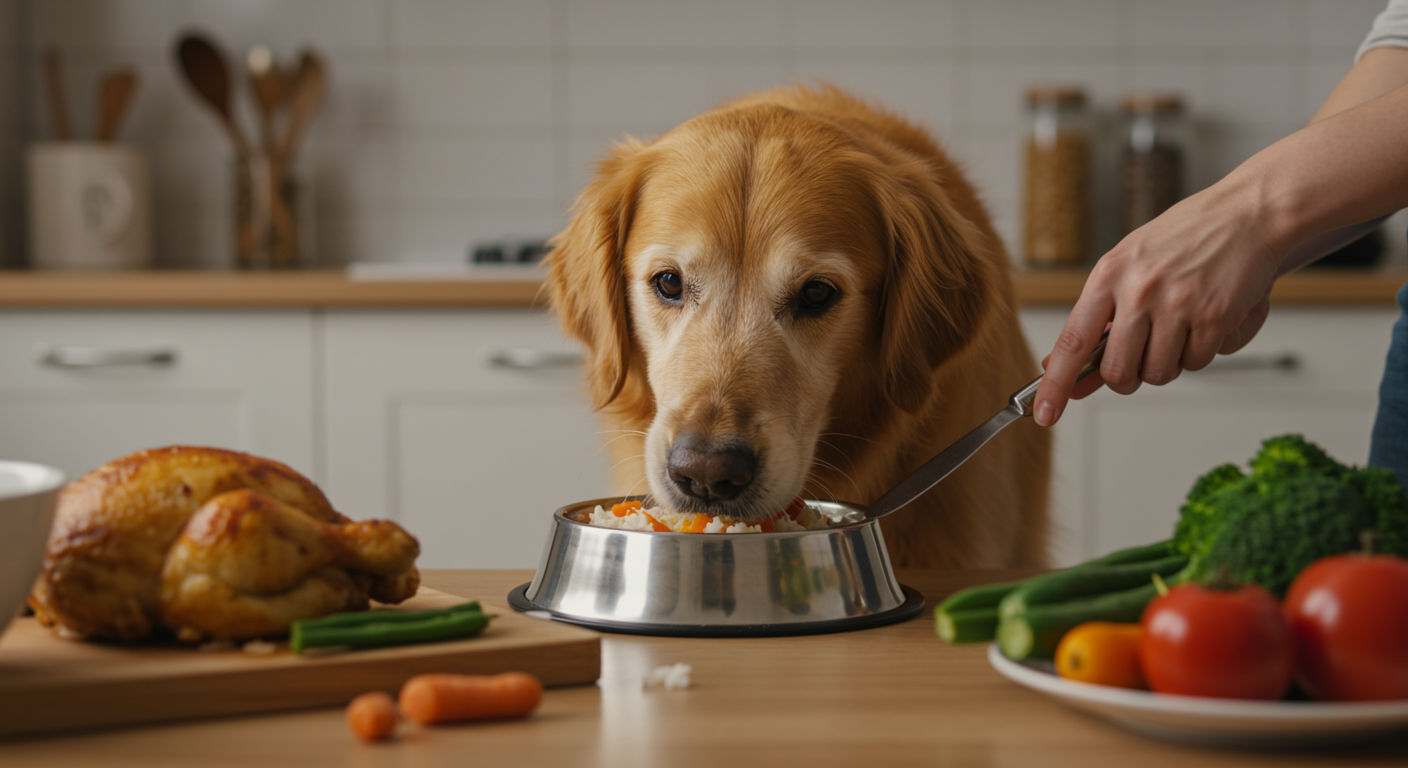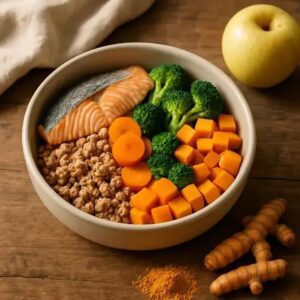Preparing homemade meals for senior Golden Retrievers offers families the opportunity to provide customized nutrition that addresses age-related dietary needs while ensuring fresh, high-quality ingredients that support optimal health and well-being. Understanding proper meal preparation helps create balanced, nutritious meals that accommodate changing digestive capabilities and nutritional requirements.
Senior Golden Retrievers often benefit from homemade meals that can be tailored to individual health conditions, food preferences, and digestive sensitivities that develop with age. Fresh, wholesome ingredients provide excellent nutrition while allowing families to control exactly what their senior companions consume.
Successful homemade meal preparation requires understanding nutritional balance, safe ingredient selection, proper food handling, and cooking methods that preserve nutrients while creating appealing, digestible meals that support senior dog health throughout their golden years.
Understanding Senior Nutritional Requirements
Age-Related Dietary Needs
Protein Requirements for Aging Dogs
Senior Golden Retrievers require high-quality, easily digestible protein to maintain muscle mass and support organ function while accommodating potentially reduced digestive efficiency that comes with aging.
Understanding protein needs helps guide ingredient selection toward lean meats, fish, and other complete protein sources that provide essential amino acids without placing excessive burden on aging digestive systems.
Protein digestibility becomes particularly important for senior dogs who may struggle with complex proteins, making cooking methods and ingredient preparation crucial for nutritional absorption.
Caloric Adjustments and Weight Management
Senior dogs typically require fewer calories due to reduced activity levels and slower metabolism, making portion control and caloric density important considerations in homemade meal preparation.
Understanding caloric needs helps families create satisfying meals that maintain ideal body weight while providing adequate nutrition for health maintenance and energy needs.
Individual caloric requirements vary based on activity level, health status, and metabolism, requiring observation and adjustment to maintain optimal body condition throughout the aging process.
Digestive System Considerations
Enhanced Digestibility Requirements
Senior Golden Retrievers benefit from meals that are easy to digest and gentle on potentially sensitive stomachs, requiring cooking methods and ingredient choices that support digestive comfort.
Understanding digestibility helps guide food preparation toward techniques that break down ingredients while preserving nutrients, making nutrition more accessible for aging digestive systems.
Texture modifications such as chopping, grinding, or cooking ingredients until tender help senior dogs process food more easily while maintaining nutritional value and meal appeal.
Fiber Balance and Digestive Health
Appropriate fiber content helps maintain digestive health while supporting regular elimination patterns that can become irregular in senior dogs with changing digestive function.
Understanding fiber balance helps families include appropriate amounts of digestible fiber through vegetables and fruits while avoiding excessive amounts that could interfere with nutrient absorption.
Soluble and insoluble fiber sources each provide different benefits, making variety in fiber-rich ingredients important for comprehensive digestive support.
Safe Ingredient Selection and Preparation
Beneficial Ingredients for Senior Dogs
Lean Protein Sources
High-quality lean meats such as chicken breast, turkey, lean beef, and fish provide excellent protein while being easier to digest than fatty or processed meat products.
Understanding protein preparation helps families cook meats thoroughly while preserving nutritional value through gentle cooking methods that don’t add unnecessary fats or seasonings.
Variety in protein sources helps ensure complete amino acid profiles while preventing food boredom and providing different nutritional benefits from various protein types.
Nutrient-Dense Vegetables
Dog-safe vegetables such as sweet potatoes, carrots, green beans, and leafy greens provide vitamins, minerals, and fiber while adding variety and nutritional density to homemade meals.
Understanding vegetable preparation helps families cook vegetables until tender while preserving nutrients through appropriate cooking methods such as steaming or gentle boiling.
Proper vegetable selection ensures that only dog-safe options are included while avoiding vegetables that could be harmful or difficult for senior dogs to digest.
Foods to Avoid
Toxic and Harmful Ingredients
Common foods that are toxic to dogs, including onions, garlic, grapes, raisins, chocolate, and xylitol-containing products, must be completely avoided in homemade meal preparation.
Understanding food toxicity helps families create safe cooking environments while ensuring that all family members know which ingredients should never be included in dog meals.
Cross-contamination prevention becomes important when preparing dog meals in kitchens where toxic ingredients are present, requiring careful attention to food safety practices.
Homemade Senior Dog Meal Planning Guide
| Meal Component | Recommended Portion | Preparation Method | Nutritional Benefits | Senior Adaptations |
|---|---|---|---|---|
| Lean Protein | 40-50% of meal | Boiled, baked, or steamed | Muscle maintenance, organ support | Thoroughly cooked, easy to chew |
| Complex Carbohydrates | 30-40% of meal | Cooked until soft | Energy, digestive health | Well-cooked for easy digestion |
| Vegetables | 10-20% of meal | Steamed or boiled | Vitamins, minerals, fiber | Chopped small, cooked tender |
| Healthy Fats | 5-10% of meal | Added during cooking | Coat health, joint support | Limited amounts, easily digestible |
| Supplements | As recommended | Mixed into meals | Address specific deficiencies | Veterinary guidance essential |
| Water Content | High moisture preferred | Cooking liquid retained | Hydration support | Especially important for seniors |
Meal Preparation Techniques
Cooking Methods for Optimal Nutrition
Gentle Cooking Approaches
Steaming, boiling, and baking represent ideal cooking methods for senior dog meals as they preserve nutrients while making ingredients more digestible without adding unnecessary fats or seasonings.
Understanding cooking techniques helps families prepare meals that are both nutritious and appealing while ensuring that cooking methods support rather than compromise digestive comfort.
Low-temperature, longer cooking times help break down ingredients thoroughly while preserving heat-sensitive vitamins and making proteins more digestible for senior dogs.
Texture Modifications
Chopping, grinding, or mashing ingredients helps senior dogs with dental issues or reduced jaw strength enjoy their meals while ensuring adequate nutrition intake.
Understanding texture needs helps families adapt meal preparation to individual capabilities while maintaining nutritional value and meal appeal through appropriate consistency modifications.
Food processors, blenders, or simple chopping can create appropriate textures while preserving ingredient integrity and nutritional content.
Food Safety and Storage
Proper Food Handling
Safe food handling practices prevent bacterial contamination and foodborne illness, which can be particularly serious for senior dogs with potentially compromised immune systems.
Understanding food safety helps families maintain hygiene throughout meal preparation while ensuring that ingredients remain safe from purchase through consumption.
Temperature control during cooking and storage helps prevent bacterial growth while preserving nutritional value and meal safety for senior dogs.
Storage and Portioning
Preparing meals in batches and freezing individual portions helps ensure consistent nutrition while making daily meal preparation more convenient for busy families.
Understanding storage techniques helps families maintain food safety while creating systems that support regular homemade meal feeding without overwhelming daily preparation requirements.
Proper labeling and rotation of stored meals helps ensure freshness while preventing waste and maintaining consistent nutritional quality.
Balanced Meal Recipes and Examples
Basic Senior Dog Meal Formulations
Simple Chicken and Rice Recipe
A basic recipe combining boneless, skinless chicken breast, brown rice, and dog-safe vegetables provides balanced nutrition while being gentle on sensitive digestive systems.
Understanding recipe scaling helps families adjust portion sizes based on individual dog size and caloric needs while maintaining proper nutritional ratios.
Cooking instructions should ensure thorough cooking of all ingredients while preserving nutritional value through gentle preparation methods.
Fish and Sweet Potato Combination
Combining cooked fish with sweet potato and green vegetables creates meals rich in omega-3 fatty acids and beta-carotene while providing easily digestible nutrition.
Understanding fish selection helps families choose appropriate fish types while avoiding species that may contain excessive mercury or other contaminants harmful to senior dogs.
Preparation techniques should ensure complete bone removal while preserving the nutritional benefits that make fish an excellent protein source for senior dogs.
Specialized Diet Adaptations
Low-Fat Meal Options
Senior dogs with pancreatitis or digestive sensitivities may require low-fat meal formulations that provide adequate nutrition while avoiding ingredients that could trigger digestive upset.
Understanding fat restriction helps families create satisfying meals that meet nutritional needs while respecting dietary limitations that support digestive health and comfort.
Cooking methods that minimize added fats while preserving flavor and nutritional value help create appealing low-fat meals for senior dogs with special dietary needs.
High-Fiber Digestive Support
Dogs experiencing digestive irregularities may benefit from meals with increased fiber content through appropriate vegetable additions and whole grain inclusions.
Understanding fiber sources helps families select ingredients that provide digestive benefits while avoiding excessive fiber that could interfere with nutrient absorption or cause digestive discomfort.
Gradual fiber increases help senior dogs adjust to dietary changes while preventing digestive upset that could result from sudden dietary modifications.
Nutritional Supplementation
Essential Supplements for Homemade Diets
Calcium and Phosphorus Balance
Homemade diets often require calcium supplementation to achieve proper calcium-to-phosphorus ratios essential for bone health and overall metabolic function.
Understanding mineral balance helps families work with veterinary professionals to ensure appropriate supplementation while avoiding imbalances that could cause health problems.
Supplement selection should be based on professional recommendations while considering individual health status and dietary composition to achieve optimal nutritional balance.
Omega-3 Fatty Acids
Fish oil or other omega-3 supplements help support joint health, cognitive function, and coat quality while providing anti-inflammatory benefits particularly valuable for senior dogs.
Understanding omega-3 benefits helps families select appropriate supplements while ensuring proper dosing based on individual dog size and health requirements.
Quality supplement selection ensures purity and potency while avoiding products that may contain contaminants or inadequate active ingredients.
Professional Guidance Integration
Veterinary Nutritionist Consultation
Working with veterinary nutritionists helps ensure that homemade diets meet all nutritional requirements while addressing individual health conditions and dietary restrictions.
Understanding professional guidance benefits helps families create comprehensive meal plans that support health while avoiding nutritional deficiencies or imbalances.
Regular nutritional assessment helps monitor the effectiveness of homemade diets while making adjustments based on health changes or evolving nutritional needs.
Transitioning to Homemade Meals
Gradual Introduction Strategies
Slow Dietary Transition
Gradually introducing homemade meals over 7-10 days helps prevent digestive upset while allowing senior dogs to adjust to new foods and textures comfortably.
Understanding transition importance helps families avoid digestive problems while building acceptance of new meal formats and flavors.
Mixing increasing proportions of homemade food with existing commercial food helps create smooth transitions while monitoring for any adverse reactions or digestive sensitivities.
Monitoring and Adjustment
Careful observation during dietary transitions helps identify any digestive issues, appetite changes, or other responses that may require meal plan modifications.
Understanding monitoring techniques helps families recognize normal adjustment responses versus concerning changes that may require professional consultation or dietary modifications.
Documentation of responses and preferences helps refine meal plans while building understanding of individual dietary needs and preferences.
Long-Term Success Strategies
Routine Development
Establishing consistent meal preparation and feeding routines helps ensure regular nutrition while making homemade feeding manageable within family schedules and capabilities.
Understanding routine importance helps families create sustainable approaches that can be maintained long-term while providing consistent, high-quality nutrition for senior dogs.
Meal planning and preparation schedules help ensure adequate nutrition while preventing last-minute feeding challenges that could compromise dietary consistency.
Quality Maintenance
Regular assessment of meal quality, nutritional adequacy, and health outcomes helps ensure that homemade diets continue to support senior dog health effectively over time.
Understanding quality indicators helps families maintain high standards while adapting meal plans based on changing health needs or ingredient availability.
Ongoing education about senior dog nutrition helps families stay informed about best practices while maintaining current knowledge about nutritional research and recommendations.
Health Monitoring and Outcomes
Assessing Dietary Success
Physical Health Indicators
Monitoring body weight, coat quality, energy levels, and overall health helps assess the effectiveness of homemade diets while identifying when adjustments may be needed.
Understanding health indicators helps families recognize positive dietary outcomes while identifying concerning changes that may require professional consultation or meal plan modifications.
Regular health assessments help ensure that homemade diets support rather than compromise overall health while maintaining optimal body condition throughout the senior years.
Behavioral and Appetite Responses
Observing appetite, eating enthusiasm, and meal-related behaviors helps assess dietary satisfaction while ensuring that homemade meals meet both nutritional and psychological needs.
Understanding behavioral responses helps families fine-tune meal plans while ensuring that homemade feeding enhances rather than complicates daily life and eating enjoyment.
Positive responses to homemade meals often include improved appetite, increased eating enthusiasm, and better overall satisfaction with meal times.
Professional Monitoring Integration
Veterinary Health Assessments
Regular veterinary check-ups help monitor the health impacts of homemade diets while ensuring that nutritional approaches support overall health management and medical care.
Understanding professional monitoring benefits helps families integrate homemade feeding with comprehensive health care while ensuring that dietary choices complement medical treatments.
Blood work and other diagnostic tests can help assess nutritional adequacy while identifying any deficiencies or imbalances that may require dietary adjustments.
Cost and Time Management
Efficient Preparation Strategies
Batch Cooking and Storage
Preparing large quantities of meals and freezing individual portions helps make homemade feeding more practical while ensuring consistent nutrition without daily cooking requirements.
Understanding batch preparation helps families create efficient systems while maintaining meal quality and safety through proper storage and handling techniques.
Time management strategies help integrate meal preparation into family routines while ensuring that homemade feeding remains sustainable and enjoyable rather than burdensome.
Budget-Friendly Ingredient Selection
Choosing cost-effective, high-quality ingredients helps make homemade feeding affordable while maintaining nutritional standards and meal quality for senior dog health.
Understanding ingredient economics helps families create nutritious meals within budget constraints while avoiding compromise on essential nutritional components.
Seasonal ingredient selection and bulk purchasing can help reduce costs while providing variety and maintaining ingredient freshness and quality.
Sustainable Practices
Long-Term Commitment
Successful homemade feeding requires long-term commitment to consistent meal preparation, nutritional monitoring, and ongoing education about senior dog nutritional needs.
Understanding commitment requirements helps families make informed decisions about homemade feeding while ensuring that they can maintain consistent, high-quality nutrition over time.
Support systems and backup plans help ensure dietary consistency even when primary meal preparers are unavailable or when circumstances make regular preparation challenging.
Preparing homemade meals for senior Golden Retrievers provides an excellent opportunity to offer customized, high-quality nutrition that supports health and well-being throughout the golden years. Through understanding nutritional requirements, safe ingredient selection, and proper preparation techniques, families can create meals that nourish both body and spirit.
Success in homemade meal preparation comes from balancing nutritional science with practical implementation, ensuring that meals meet health needs while remaining manageable within family routines. With proper planning, professional guidance, and attention to individual needs, homemade meals can significantly contribute to senior dog health and happiness.
The investment in homemade meal preparation demonstrates dedication to providing the best possible nutrition while strengthening the bond between families and their senior Golden Retrievers through the loving preparation of nourishing, delicious meals.





Comments
Pingback: How My Senior Golden Retriever Changed Routine